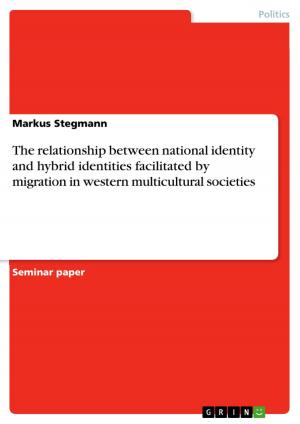The Impact of the Cold War on Germany's Immigration and Citizenship Policies from 1945 to 2000
Nonfiction, Social & Cultural Studies, Political Science, International, International Security| Author: | Kristina Beckmann | ISBN: | 9783638165013 |
| Publisher: | GRIN Publishing | Publication: | January 17, 2003 |
| Imprint: | GRIN Publishing | Language: | English |
| Author: | Kristina Beckmann |
| ISBN: | 9783638165013 |
| Publisher: | GRIN Publishing |
| Publication: | January 17, 2003 |
| Imprint: | GRIN Publishing |
| Language: | English |
Bachelor Thesis from the year 2002 in the subject Politics - International Politics - Topic: Peace and Conflict Studies, Security, grade: 70 / 1- (A-), South Bank University London (Humanities and Social Science), 24 entries in the bibliography, language: English, abstract: Since 1945, various groups of immigrants have made their way to Germany, which has been an attractive destination because of its prosperity and its location in the centre of Europe. However, for a long time Germany's politicians upheld the perception that Germany was not a country of immigration and therefore failed to develop a common immigration and citizenship policy. This paper will depict this paradox and its consequences, which are a mix of policies that the government adopted for different groups of immigrants. Furthermore, Germany's immigration and citizenship policies were significantly influenced by internal and external political factors, which arose out of the Cold War. As a consequence, Germany had to react to the radical change in international politics in 1989. This paper will attempt to analyse these factors by highlighting Germany's three main groups of immigrants: ethnic Germans, labour migrants and asylum seekers. The influx of ethnic Germans in the aftermath of World War II shaped Germany's exceptional notion citizenship. This notion found its expression in Article 116 of the constitution and is rooted in German history, but was also shaped by the ideologies of the Cold War. This paper will show that Germany's citizenship policy resulted from its geographical division into a capitalistic West and a communist East and that it made an artificially distinction between ethnic Germans and other immigrants such as labour migrants and asylum seekers. The collapse of communism and Germany's unification in 1989 led to a change in German immigration and citizenship policies. It signalled an end to ideologically motivated policies regarding immigration. Open borders and an increased influx of ethnic Germans and asylum seekers induced the government to take restrictive measurements in order to gain control over these inflows. This paper will address the most significant changes, which consisted of the reappraisal of the notion of German citizenship and an amendment of Germany's generous right to asylum.
Bachelor Thesis from the year 2002 in the subject Politics - International Politics - Topic: Peace and Conflict Studies, Security, grade: 70 / 1- (A-), South Bank University London (Humanities and Social Science), 24 entries in the bibliography, language: English, abstract: Since 1945, various groups of immigrants have made their way to Germany, which has been an attractive destination because of its prosperity and its location in the centre of Europe. However, for a long time Germany's politicians upheld the perception that Germany was not a country of immigration and therefore failed to develop a common immigration and citizenship policy. This paper will depict this paradox and its consequences, which are a mix of policies that the government adopted for different groups of immigrants. Furthermore, Germany's immigration and citizenship policies were significantly influenced by internal and external political factors, which arose out of the Cold War. As a consequence, Germany had to react to the radical change in international politics in 1989. This paper will attempt to analyse these factors by highlighting Germany's three main groups of immigrants: ethnic Germans, labour migrants and asylum seekers. The influx of ethnic Germans in the aftermath of World War II shaped Germany's exceptional notion citizenship. This notion found its expression in Article 116 of the constitution and is rooted in German history, but was also shaped by the ideologies of the Cold War. This paper will show that Germany's citizenship policy resulted from its geographical division into a capitalistic West and a communist East and that it made an artificially distinction between ethnic Germans and other immigrants such as labour migrants and asylum seekers. The collapse of communism and Germany's unification in 1989 led to a change in German immigration and citizenship policies. It signalled an end to ideologically motivated policies regarding immigration. Open borders and an increased influx of ethnic Germans and asylum seekers induced the government to take restrictive measurements in order to gain control over these inflows. This paper will address the most significant changes, which consisted of the reappraisal of the notion of German citizenship and an amendment of Germany's generous right to asylum.















